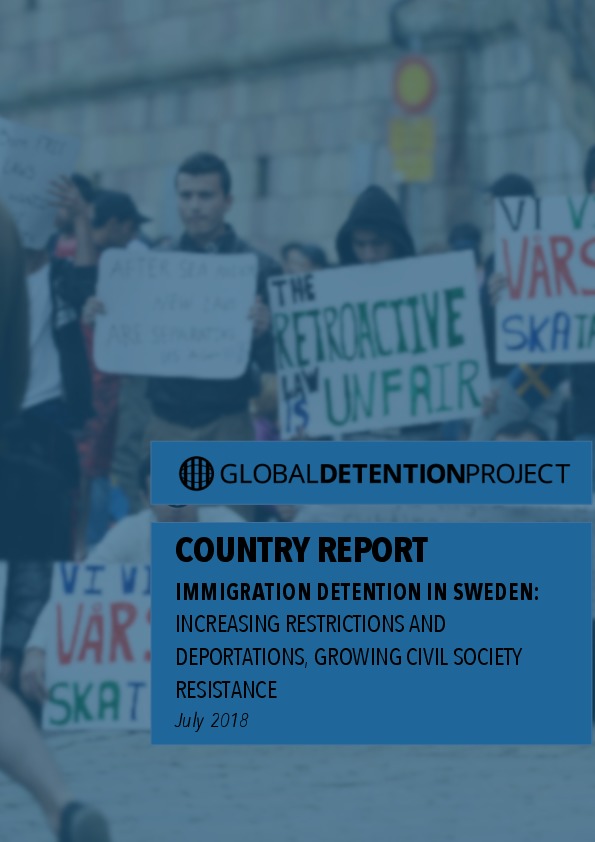Part II of the GDP’s Special Series investigates how new information and communications technologies are used during irregular migration. Featuring on-the-ground reports, the paper examines the diverse ways migrants and refugees put social media to use during their journeys and helps address gaps in current literature regarding the role of digital platforms in contemporary migration contexts. […]
Detention and Restriction of Movement of Asylum Seekers under EU Law: Deterrence, Incapacitation and Surveillance
On 5-6 October, GDP Researcher Izabella Majcher will participate in the IV CINETS Conference 2018—“Mobility and Security in an Era of Globalisation: Crimmigration at the Crossroads?”—hosted by Queen Mary, University of London. Her presentation, “Detention and Restriction of Movement of Asylum Seekers under EU Law: Deterrence, Incapacitation and Surveillance,” will take place on Friday 5 October, at 14:45-16:30. […]
NEWSLETTER: September 2018
✅ Human Rights Abuses in Egypt’s Detention Centres
✅ A Regional View of Detention in Scandinavia
✅ GDP On The Record […]

Immigration Detention in Egypt: Military Tribunals, Human Rights Abuses, Abysmal Conditions, and EU Partner
Egypt has long been a destination and transit country for refugees, asylum seekers, and migrants from across the Middle East and Africa. Its Mediterranean coast has served as an important staging point for people attempting to reach Europe irregularly. Observers have repeatedly expressed concerns about Egypt’s use of police stations and prisons for immigration detention […]

Temporary Accommodation Centre (from report of the European Committee for the Prevention of Torture 2018 visit to Georgia)
B. Establishments for foreign nationals deprived of their liberty under aliens legislation; (Read full CPT report)32. The CPT’s delegation carried out a first-time visit to Georgia’s only immigration detentionfacility (opened in 2014), the Temporary Accommodation Centre of the Migration Department ofthe Ministry of Internal Affairs (hereafter, TAC or the Centre). Located in Varketili district ofTbilisi, […]

August 2018 Newsletter
✅ Libya’s Human Rights Crisis
✅ Limited Use of “Alternatives” in Finland
✅ GDP On The Record […]

Immigration Detention in Libya: “A Human Rights Crisis”
Libya is notoriously perilous for refugees, asylum seekers, and migrants, who often suffer a litany of abuses, including at the country’s numerous detention facilities. Conditions at these facilities, many of which are under the control of militias, are deplorable. There are frequent shortages of water and food; over-crowding is endemic; detainees can experience physical mistreatment […]

Immigration Detention in Finland: Limited Use of “Alternatives,” Restrictive Detention Review, Divisive Political Debate
Finland does not place as many migrants and asylum seekers in detention as do neighbouring Sweden and other nearby European countries. However, the country’s authorities rarely grant “alternatives to detention,” instead deeming detention to be the most efficient and cost-effective method for removing non-citizens from the country. […]

July 2018 Newsletter
Welcome to the Global Detention Project’s monthly newsletter. For any questions about our content, please contact us at: admin@globaldetentionproject.org OUR LATEST PUBLICATIONS Immigration Detention in Sweden: Increasing Restrictions and Deportations, Growing Civil Society Resistance Sweden used to be lauded for its comparatively humane treatment of asylum seekers and undocumented migrants. However, since the onset of the […]

Immigration Detention in Sweden: Increasing Restrictions and Deportations, Growing Civil Society Resistance
Sweden used to be lauded for its comparatively humane treatment of asylum seekers and undocumented migrants. However, since the onset of the “refugee crisis,” the country has introduced a series of restrictive immigration control measures and the domestic political environment has become increasingly hostile. Even as the numbers of refugee applicants have steadily fallen, the […]




